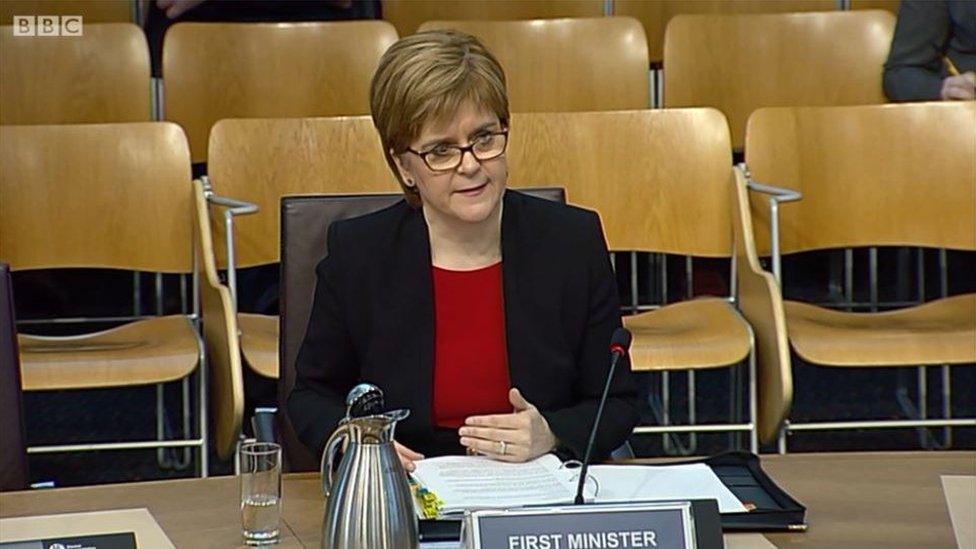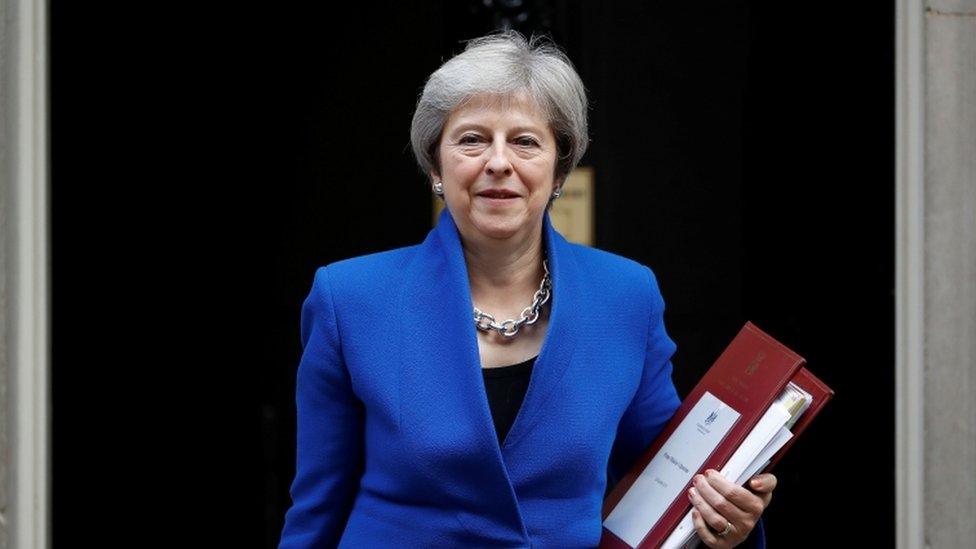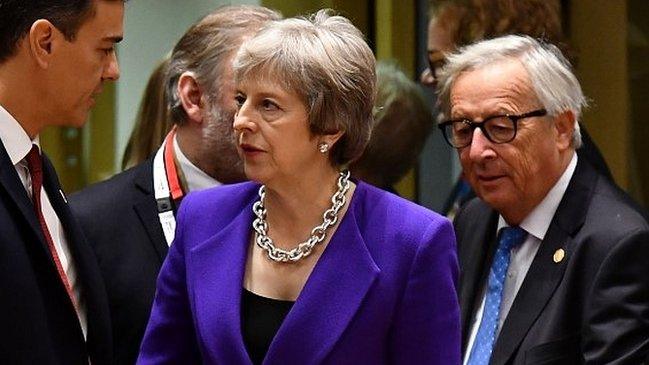Brexit dominates as Sturgeon faces committee heads
- Published

The first minister regularly faces the serried ranks of Holyrood's committee conveners. Entirely understandably, these sessions can be somewhat disparate, at least as viewed by the wicked media who are zealous in search of news.
Customarily, each convener takes a shottie at posing questions to the FM. This means that the exchanges range across the substantial panoply of Holyrood powers.
All very right and proper, all entirely justifiable. But frustrating for the media - although it should be said that it is not the role of parliament to provide news sustenance to journalists. At least, not exclusively.
No Deal
However, today was somewhat different. It will not have escaped your notice that one topic is tending to dominate discourse at the moment. Brexit.
Today a succession of conveners pursued exactly that topic in various guises. Firstly, James Dornan asked about the impact on local government services.
Then Joan McAlpine, who convenes the Europe committee, asked about prospects for No Deal. Bruce Crawford of Finance and Constitution said he was trying to avoid despondency before voicing disquiet.
Graham Simpson of Delegated Powers asked about - well, delegated powers. Not unreasonable - and also highly pertinent because it raised the topic of the extent of co-operation between Westminster and Holyrood.
Nicola Sturgeon believes the UK government is "closing down the negotiating space" to achieve a Brexit deal
Bill Kidd asked……OK, you get the concept by now. There were questions - good questions - about health, education, social security, the economy et al.
But Brexit dominates public discourse at the moment and so, rightly, dominated this session. Nicola Sturgeon noted, with a wry grin, that Mr Crawford was endeavouring to remain upbeat.
However, for herself, she found it hard to discern anything other than gloom. Things, she said, might change. Today, tomorrow or next month.
But, right now, as of today, she said the Brexit talks looked to be heading for no resolution. That meant no deal and, according to the first minister, calamity for Scotland.
She said that every statement made by the prime minister contributed to the problem, reducing the capacity for compromise. She depicted the PM as being in a self-dug trench, still resolutely digging.

The prime minister has insisted a Brexit deal can still be struck with the EU
Relations with the UK government over Brexit? Not great and scarcely helped by the decision to proceed with the Withdrawal Bill in the face of Holyrood opposition.
Prospects for future co-operation? See above. The FM sympathised to some extent with Whitehall which she depicted as overwhelmed by Brexit.
But, she said, sundry departments in SW1 still tended to see consultation with devolved administrations as a nuisance - rather than a valid constitutional necessity.
This prompted an intriguing exchange with Mr Crawford who noted that other countries viewed the division of powers as an opportunity to examine alternative viewpoints, not an exercise to be endured.
Scarcely designed to improve Mr Crawford's normally sunny temperament. (He is remarkably sanguine, for a Dunfermline supporter.) But, of course, the FM wanted to tell it like it is. From her perspective, that is.
'People's Vote'
Not all, of course, pursue that perspective. Indeed, the Conservatives issued a statement after her committee appearance, arguing that she was deliberately being difficult, standing in the way of Brexit, whatever potential gain it represented for Scotland.
There was a comparable tone from exchanges in the Commons. The Liberal Democrats, like the SNP, oppose Brexit. But they do so from a rather different standpoint.
For one thing, the Lib Dems are principal cheerleaders for what they call a "People's Vote". Nicola Sturgeon has been persuaded late in the day to assent to such an option - although she is scarcely an enthusiast and did not find the time to include it in her list of alternative actions by the Commons today.
For another, the Liberal Democrats want to preserve two Unions - that of the EU and that of the UK. Their MP, Christine Jardine, suggested to the PM that in seeking to leave the EU, she might also be placing a strain upon the United Kingdom because its constituent parts had voted in different ways.
She accused the Tories of "narrow nationalism". In response, Theresa May smiled benignly at the attack. (She's had a lot of practice.)
Such gloom was misplaced - as was, by implication, the different version voiced by the FM. The PM said she was working flat out for a deal which would benefit Scotland and the rest of the United Kingdom.
With which, the PM was off to face an even tougher audience at Westminster tonight. A private meeting with her own backbenchers.
- Published18 October 2018
